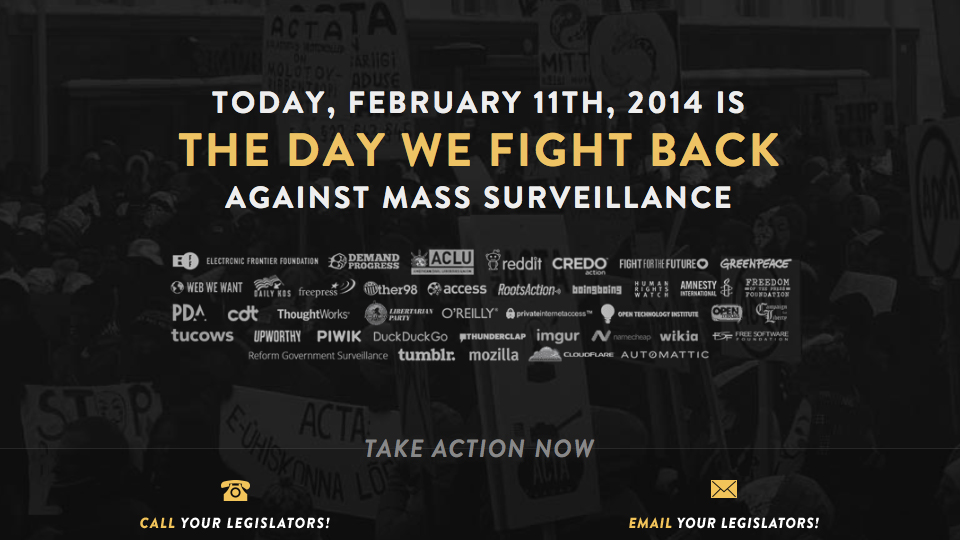The Snowden revelations have confirmed our worst fears about online spying. They show that the NSA and its allies have been building a global surveillance infrastructure to “master the internet” and spy on the world’s communications. These shady groups have undermined basic encryption standards, and riddled the Internet’s backbone with surveillance equipment.
They have collected the phone records of hundreds of millions of people none of whom are suspected of any crime. They have swept up the electronic communications of millions of people at home and overseas indiscriminately, exploiting the digital technologies we use to connect and inform. They spy on the population of allies, and share that data with other organizations, all outside the rule of law.
We aren’t going to let the NSA and its allies ruin the Internet. Inspired by the memory of Aaron Swartz, fueled by our victory against SOPA and ACTA, the global digital rights community are uniting to fight back.
On February 11, on the Day We Fight Back, the world will demand an end to mass surveillance in every country, by every state, regardless of boundaries or politics. The SOPA and ACTA protests were successful because we all took part, as a community. As Aaron Swartz put it, everybody "made themselves the hero of their own story." We can set a date, but we need everyone, all the users of the Global Internet, to make this a movement.
Here’s part of our plan (but it’s just the beginning). Last year, before Ed Snowden had spoken to the world, digital rights activists united on13 Principles. The Principles spelled out just why mass surveillance was a violation of human rights, and gave sympathetic lawmakers and judges a list of fixes they could apply to the lawless Internet spooks. On the day we fight back, we want the world to sign onto those principles. We want politicians to pledge to uphold them. We want the world to see we care.
Here's how you can join the effort:
-
We're encouraging websites to point to The Day We Fight Back website, which will allow people from around the world to sign onto our 13 Principles, and fight back against mass surveillance by the NSA, GCHQ, and other intelligence agencies. If you can let your colleagues know about the campaign and the website (https://thedaywefightback.org/?r=eff) before the day, we can send them information on the campaign in each country.
-
Tell your friends to sign the 13 Principles! We will be revamping our global action center here to align ourselves with the day of action. We’ll continue to use the Principles to show world leaders that privacy is a human right and should be protected regardless of frontiers.
-
Email: If you need an excuse to contact your members or colleagues about this topic, February 11th is the perfect time to tell them to contact local politicians about Internet spying, encourage them to take their own actions and understand the importance of fighting against mass surveillance.
-
Social media: Tweet! Post on Facebook and Google Plus! We want to make as big of a splash as possible. We want this to be a truly global campaign, with every country involved. The more people are signing the Principles, the more world leaders will hear our demands to put a stop to mass spying at home and overseas.
-
Tools: Develop memes, tools, websites, and do whatever else you can to encourage others to participate.
-
Be creative: plan your own actions and pledge. Take to the streets. Promote the Principles in your own country. Then, let us know what your plan is, so we can link and re-broadcast your efforts.
All 6 (or more!) would be great, but honestly the movement benefits from everything you do.
The organizers of the Day We Fight Back are Demand Progress, Access, EFF, Internet Taskforce, FFTF, Free Press, Mozilla, Reddit, ThoughtWorks, BoingBoing.
The Internet’s spies have spent too long listening on our most private thoughts and fears. Now it’s time they really heard us. If you share our anger, share the principles: and fight back.
3 WAYS TO SHOW YOUR SUPPORT
- Log in to post comments



















